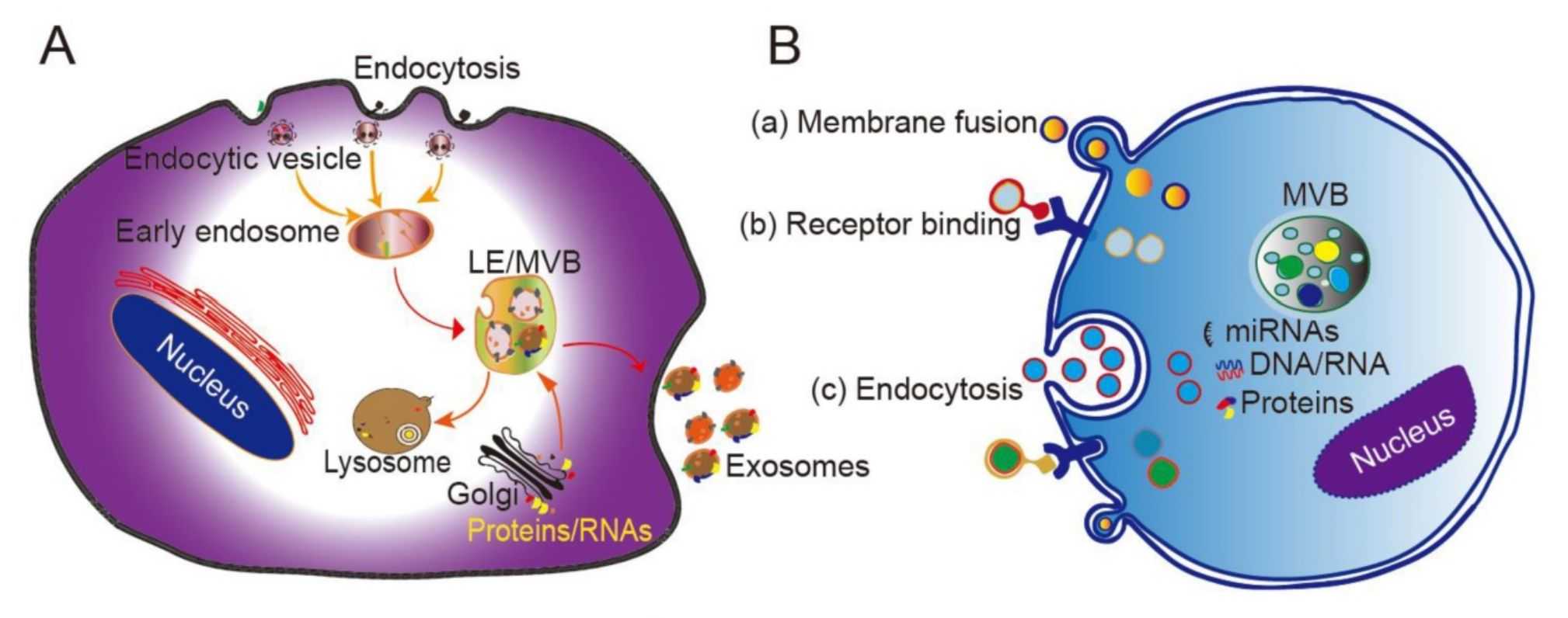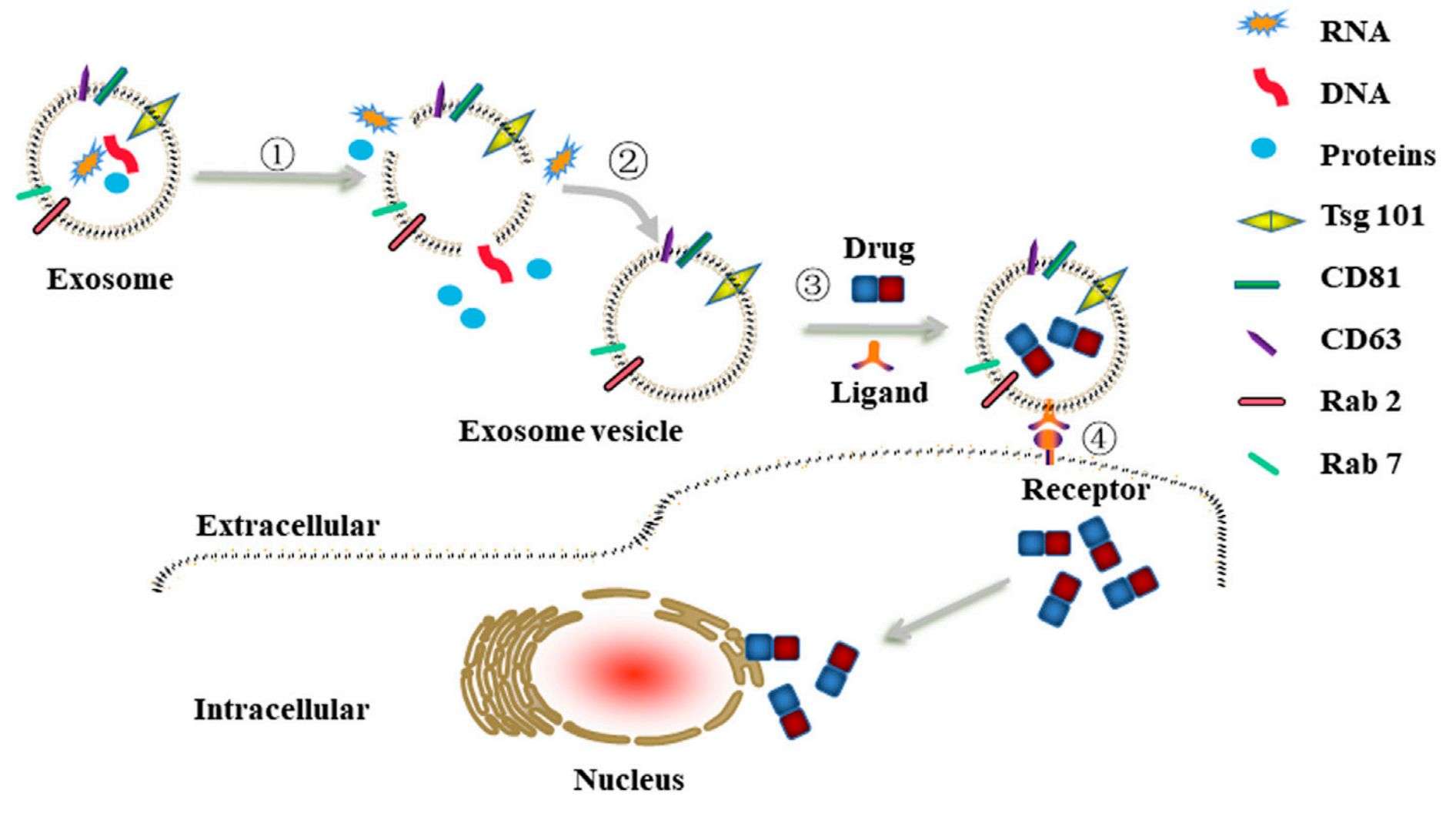Exosomes as Drug Carriers
Drug distribution is essential to ensure the effectiveness and safety of therapeutic molecules. In the course of administrations, a variety of delivery means have been developed for enhancing drug effectiveness as well as reducing off-target side effects and associated toxicity. Among the emerging approaches, exosomes are gaining momentum as a potential technology in nanomedicine.
Exosomes are 30-150nm extracellular vesicles with lipid bilayers that transport various active biomolecules from donor to recipient cells. Thus, exosomes have become an attractive vehicle for drug delivery.
 Figure 1. Biogenesis, secretion, and cellular entry of exosomes. (Liang Y, et al., 2021)
Figure 1. Biogenesis, secretion, and cellular entry of exosomes. (Liang Y, et al., 2021)
Why Choose Exosomes as Drug Carriers?
Exosomes have a lipid bilayer structure, which can effectively package hydrophobic and hydrophilic drugs. The peptides on the exosome surface can specifically bind to receptors on target cells, accelerating the accumulation of drugs in target tissues. In addition, exosomes contain multiple active ingredients and thus can be loaded with a wide variety of drug types, including small molecules, nucleic acids, and proteins. Since exosomes are endogenous substances, without immunogenicity, and with high safety.
Exosomes can circulate to all the chambers of the body, have better tissue selectivity, and can cross the blood-brain barrier, accomplishing drug delivery to the central nervous system. In addition, it is possible to carry out complex engineering modification of exosomes, through genetic, chemical, or physical ways, to regulate the composition and biological function of exosomes, to better serve the therapeutic purpose.
Engineering Exosomes
The unique properties and the ability to carry cargo make exosomes ideal candidates for drug delivery vehicles. However, several factors limit their clinical therapeutic applications, such as barriers associated with exosome isolation, characterization, quality checks and the possibility of reproducing functional assays under in vitro and in vivo conditions, low targeting capacity, and loading efficiency. Therefore, engineering exosomes is an effective way to overcome these limitations and improve therapeutic drug loading capacity.
 Figure 2. Schematic of engineered exosomes as drug carriers. (Chen L, et al., 2022)
Figure 2. Schematic of engineered exosomes as drug carriers. (Chen L, et al., 2022)
An essential part of drug delivery system (DDS) design is the selection of an appropriate drug loading method. There are two main methods for loading drugs into exosomes: exogenous loading ( exosomes are isolated and then loaded with drugs) and endogenous loading (drugs are loaded into donor cells, which secrete exosomes loaded with drugs). RNA, proteins, nucleic acids, and a variety of small molecules, can be loaded endogenously. However, endogenous loading is more difficult to experiment with and takes longer. In contrast, exogenous loading is simpler to perform, has greater lot-to-lot stability, and is more suitable for scale-up.
The surface of exosomes is essential for biodistribution, the ability to target specific cells, and therapeutic potential. In addition to cargo loading, multiple strategies need to be considered to improve exosome targeting and enhance the ability to successfully reach recipient cells and promote cellular uptake. Exosome targeting can be achieved by acting on donor cells that secrete exosomes (indirect modification) or by directly modifying isolated exosomes.
Application
As a new nanoscale delivery system, exosome has many benefits, such as high biocompatibility, low toxicity, high specificity, small size, long half-life, and easier accumulation in cancer cells, and these properties make it a good choice. Exosomes as drug delivery carriers are mainly used in the following areas
- Exosomes for ASO Delivery
- Exosomes for siRNA Delivery
- Exosomes for miRNA Delivery
- Exosomes for mRNA Delivery
- Exosomes for lncRNA Delivery
- Exosomes for Protein Delivery
- Exosomes for Small Molecule Delivery
Creative Biostructure is an exosome service provider and supplier of high-quality exosome products. In terms of exosome drug delivery, our professional team of scientists can provide the most comprehensive engineered exosome construction services, including upstream exosome isolation, characterization, and quality analysis, as well as downstream exosome drug loading and target modification.
We also provide clients with systematic exosome analysis technology to comprehensively understand the protein, lipid, and RNA content of exosomes through high-throughput multi-omics solutions to design effective exosome-based drug carriers. If you would like to construct innovative engineered exosomes, please feel free to contact us with your specific requirements.
References
- Liang Y, et al. Engineering exosomes for targeted drug delivery. Theranostics. 2021. 11(7): 3183-3195.
- Chen L, et al. Exosomes as Drug Carriers in Anti-Cancer Therapy. Front Cell Dev Biol. 2022. 10: 728616.